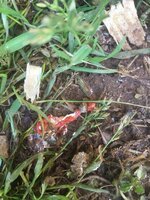ALong12
Songster
- Mar 6, 2019
- 121
- 163
- 106
Noticed Sunday some strange droppings in my super blue egg layers coop & there is also 2 leghorns in there chicks range from 4 weeks to almost 3 months (same size, I have a blue & white leghorn chicks with them right now)
anyways droppings looked like intestinal shedding so I was immediately concerned, well today after church I went to check on them & give some love & noticed the blood. I went into a panic!
Off to the store to get corid!
Got home & got them started on it as well as my “yard peckers” that free range around the coop
my Question is what out come should I be looking at
none of them showed signed of illness except a cross beaked one I had (when I felt her, I could tell she was not getting enough to eating even though Ive done all measures & wasnt growing like the others, had to euthanize her ...
...
anyways droppings looked like intestinal shedding so I was immediately concerned, well today after church I went to check on them & give some love & noticed the blood. I went into a panic!
Off to the store to get corid!
Got home & got them started on it as well as my “yard peckers” that free range around the coop
my Question is what out come should I be looking at
none of them showed signed of illness except a cross beaked one I had (when I felt her, I could tell she was not getting enough to eating even though Ive done all measures & wasnt growing like the others, had to euthanize her
 ...
...



